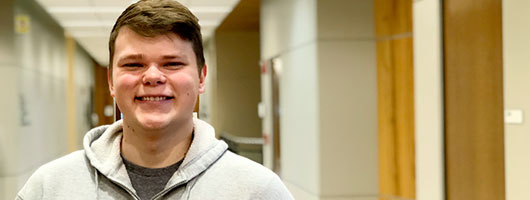 Pictured | Zachary Clayton Snider | Secondary Education, Social Studies / Minor in Political Science | Nappanee, Indiana (hometown)
Pictured | Zachary Clayton Snider | Secondary Education, Social Studies / Minor in Political Science | Nappanee, Indiana (hometown)
Club Affiliations and Volunteer Activities | History Club, Honors Program, Titans Feeding Titans; Titus the Titan (mascot)
Bachelor of Science in Education/Social Studies
The Bachelor of Science in Education with a specialization in Social Studies prepares secondary education graduates to teach various areas of social studies and history for grades 5-12. The program is aligned with the developmental standards for both the middle school/junior high and high school levels as defined by the Indiana Department of Education.
Programs are aligned to standards for the related Special Professional Associations (SPAs).
Academic Advising
College policy on advising requires that students meet with their academic advisors at least once each year, and in some departments, prior to each semester’s to enrollment. Advising holds are placed on all [name of college/school] students prior to advance registration and are released following advising appointments. Students with a declared major are advised in their academic units. To determine who your advisor is and how to contact them, see One.IU.
Degree Requirements
Degree Map>>
Students receiving the Bachelor of Science in Education, Secondary Education (Social Studies) must complete 120 total credit hours including:
- IU South Bend Campuswide General Education Curriculum (42 cr.) to include:
- Oral Communication Requirements
- EDUC-F 201 Exploring the Personal Demands of Teaching: Laboratory Experience (2 cr.); AND
- EDUC-F 202 Exploring the Personal Demands of Teaching: Field Experience (1 cr.); AND
- EDUC-M 314 General Methods for Senior High/Junior High/Middle School Teachers
- Quantitative Reasoning Requirement
- MATH-M 111 Mathematics in the World; OR
MATH-M 118 Finite Mathematics
- Major Requirements (59 cr.)
- Concentration Requirements (12 cr.)
- Electives (7 cr.)
- An overall GPA of 2.75 is required for admission into the Teacher Education Program (TEP).
- Students must successfully complete EDUC-F 201/EDUC-F 202, EDUC-H 340, EDUC-M 314, EDUC-P 250, EDUC-W 200, and EDUC-W 310 and pass the CASA Basic Skills Examination to be eligible to enroll in Foundations II courses.
- All secondary education programs require passing the Pearson Content test prior to student teaching.
- All courses are 3 credit hours, unless otherwise noted.
Major Requirements (59 cr.)
- ECON-E 104 Introduction to Macroeconomics; OR
GEOG-G 110 Introduction to Human Geography - EDUC-K 306 Teaching Students with Special Needs in Secondary Classrooms
- EDUC-M 301 Laboratory/Field Experience (1 cr.)
- EDUC-M 401 Laboratory/Field Experience (1 cr.)
- EDUC-M 420 Student Teaching Seminar (2 cr.)
- EDUC-M 441 Methods of Teaching Senior/Junior High/Middle School Social Studies
- EDUC-M 464 Methods of Teaching Reading
- EDUC-M 480 Student Teaching in the Secondary School (10 cr.)
- EDUC-P 407 Psychological Measurement in the Schools
- EDUC-P 475 Adolescent Development and Classroom Management
- HIST-A 363 Hoosier Nation: Indiana in American History
- HIST-H 101 The World in the Twentieth Century I
- HIST-H 105 American History I
- HIST-H 106 American History II
- HIST-H 113 History of Western Civilization I
- HIST-H 114 History of Western Civilization II
- Asian/African History (200-level and above)
- European or United States History (300-400 level)
- Latin American, Russian, or Middle Eastern History (200-level and above)
Concentration Requirements (12 cr.)
Select one of the following concentrations or licensure:
Concentration in Economics
- ECON-E 103 Introduction to Microeconomics
- ECON-E 104 Introduction to Macroeconomics
Select two of the following:
- ECON-E 304 Survey of Labor Economics
- ECON-E 305 Money and Banking
- ECON-E 308 Survey of Public Finance
- ECON-E 321 Intermediate Microeconomic Theory
- ECON-E 322 Intermediate Macroeconomic Theory
Concentration in Sociology
- SOC-S 161 Principles of Sociology
Select one of the following:
- SOC-S 351 Social Statistics
- SOC-S 353 Qualitative Research Methods
- SOC-S 354 Quantitative Research Methods
Select one of the following:
- SOC-S 317 Social Stratification
- SOC-S 335 Race and Ethnic Relations
- SOC-S 338 Gender Roles
- SOC-S 348 Introduction to Sociological Theory
- SOC-S 349 Topics in Contemporary Sociological Theory
Concentration in Government/Citizenship
- POLS-Y 103 Introduction to American Politics (already taken as a major requirement)
- POLS-Y 107 Introduction to Comparative Politics
- POLS-Y 109 Introduction to International Relations
- One 300+ level course
Concentration in Psychology
Select one of the following:
- PSY-P 103 General Psychology
- PSY-P 335 Cognitive Psychology
Select one of the following:
- PSY-P 316 Psychology of Childhood and Adolescence
- PSY-P 320 Social Psychology
- PSY-P 390 Special Topics in Psychology
- PSY-P 434 Community Psychology
- PSY-P 460 The Psychology of Women
Select one of the following:
- PYS-P 319 The Psychology of Personality
- PSY-P 324 Abnormal Psychology
Licensure in Geography
- GEOG-G 110 Introduction to Human Geography
- GEOG-G 201 World Regional Geography
- GEOG-G 213 Introduction to Economic Geography
- GEOG-G 313 Place and Politics
Electives (7 cr.)
- The Secondary Education Social Studies major requires 7 elective credits. Please see your advisor regarding approved electives.